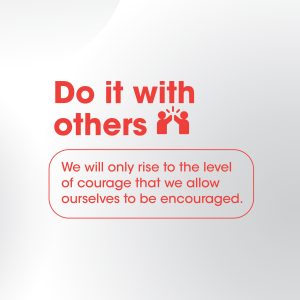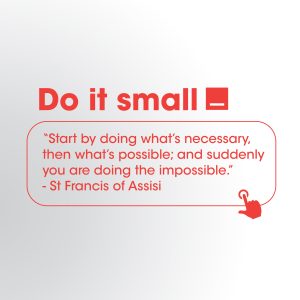Written by Alpha Asia Pacific together with Reverend Abel Cheah, Leadership Development Director, Alpha Asia Pacific and pastor at Holy Trinity Bukit Bintang.
In a recent survey with 1,000 pastors on their most pressing needs, “apathy” was ranked as the single biggest pastoral concern of 2022.
Church leaders are worried about keeping their teams motivated in this season of post-pandemic re-emergence, but they are also struggling to stay motivated themselves. And for good reason: pastors and leaders have exerted themselves to incredible lengths to meet the pastoral needs of their congregation and surmount multiple ministry changes and challenges for the past two years. As a Christian leader, you may be struggling to keep a sense of purpose and momentum in your workplace, school, ministry and home right now.
How can we stay motivated amid a time of reset and re-evaluation?
Here, we spoke recently with Reverend Abel Cheah, who shared some practical tips for Christians on how to stay motivated, in a period when people may seem to fear and resent commitment.
1. Do it for joy
That’s right – we often think motivation comes from doing something ‘with joy’, but what if the key to motivation is to do it ‘for joy’?
When a team or person is apathetic, this is usually a symptom of something deeper. Our first task as leaders is to diagnose correctly why we may be demotivated. What if you are not facing a crisis of motivation, but a drought of meaning?How then do you grow greater motivation to stay on the course that God has for you?
Start with connecting your everyday, mundane tasks to the greater joy resulting from your faithfulness in the little things.
In Hebrews 12:1-2, the author challenges the church to stay steadfast in seasons of instability by reminding them: “let us run with perseverance the race marked out for us, fixing our eyes on Jesus, the pioneer and perfecter of faith. For the joy set before him, he endured the cross, scorning its shame, and sat down at the right hand of the throne of God”.
The author writes that perseverance is a matter of focus and connection. Our focus is Jesus, who stayed motivated “for the joy set before him” (us!), for which he endured the cross and scorned its shame. Our connection is to the “great cloud of witnesses”, the body of Christ and the family of God we belong to, and the joy that comes with faithful endurance.

In Jesus, we learn that godly motivation has more to do with anticipating joy than it has to do with enduring pain.
Procrastination happens when a current pain is disconnected from a sense of future reward.
Discipline happens when a current pain is connected to a sense of future reward.
The difference? What you’re connected to.
So, what are your joy and sense of future reward?
Every worthy goal has within it an enduring and expectant joy. You can wash those dishes to set an example of responsibility to the children. You can write that report because your work is a worship to the Lord and a way to serve your colleagues. You can show up at someone’s wedding or funeral to love as Jesus does. Each ordinary task, when connected to a future reward, becomes more than the sum of its parts.
After all, it wasn’t the cross itself that motivated Jesus through His mission, but His joy that gave purpose to the cross.
2. Do it with others
Demotivation comes from disconnection. It’s been said, “if you want to go fast, go alone; but if you want to go far, go together”.
Christian motivation is a long obedience in the same direction. It must start with a single step, even if it is ridiculously small. The Christian journey is meant to be taken together in community.
Why do we sometimes find it hard to start something we’re supposed to do? Procrastination is often caused by a disconnection from meaning and a lack of momentum. I may intellectually understand something as important, but until I can experience a sense of possibility and momentum about accomplishing it, the task remains only a good idea.
We will only rise to the level of courage that we allow ourselves to be encouraged.

Even the formula for momentum gives us a hint: momentum is made up of mass and velocity (p=mv) – the more people we involve (ie “mass”) in the responsibility, the greater a sense of momentum.
This is why Hebrews 12 begins with the words “Therefore since we are surrounded by so great a cloud of witnesses … let us run with endurance the race that is set before us”. We are not meant to take this journey on our own; there isn’t enough fuel to keep going before a burnout happens. The bravest words a leader could ever say are, “Can you help me?”
Don’t go alone.
3. Do it small
To build momentum in any team, you can either achieve something on a bigger scale with others or start something small quickly. We can only improve what is first initiated. Just start somewhere, and don’t be afraid to start ridiculously small.
St Francis of Assisi once said, “Start by doing what’s necessary, then what’s possible; and suddenly you are doing the impossible.” In Zechariah 4:10, we are reminded, “Do not despise these small beginnings, for the Lord rejoices to see the work begin”. Never underestimate the potential of a seed – every great feat began somewhere small.

Do you have a long day ahead? Start your day by folding your blanket. Do you have a series of articles to write? Start with a paragraph – aim to do something small as a goal in itself. Do you have a sermon to write? Break it down into its parts and start with the first – then celebrate its completion.
And start the day right, for it’s been said that “motivation is made in the morning”.
You can do it with others, do it small, and do it FOR joy!
Self-coaching questions:
- Who is counting on me to do today’s tasks? If you are able to connect a loved one with a task to endure, you are more likely to find a deeper purpose to the responsibility
- Why am I doing this? What is the future reward of engaging with this? What might a future joy resulting from being faithful to this task look like?
- How can I worship God in the tasks I am doing today? Hebrews 13:16 says, “Do not neglect to do good and to share what you have, for such sacrifices are pleasing to God”. Good work done faithfully brings joy to the Lord.
Looking for more leadership resources? Alpha will be hosting Leadership Conference 2022, a truly global online experience on the 2nd and 3rd May 2022. #LC22 will be a time for leaders, from whatever sphere, to have an opportunity to encounter God, be filled with the Holy Spirit, and be mobilised to continue evangelising the nations, revitalising the church and transforming society. Register your spot for free now.
About Rev Abel Cheah
Rev Abel Cheah is the Leadership Development Director of the Alpha Asia Pacific Hub and a pastor (curate) at Holy Trinity Bukit Bintang (HTBB) Church. Together with his wife Jacintha, he pastors the 9.30 am service at HTBB. His previous roles include Chief Operating Officer of Alpha Asia Pacific, National Coordinator of Alpha Malaysia and Head of Regions of Teach For Malaysia. His current leadership focus is to help leaders raise and develop other leaders in the wake of the post-pandemic reset.
Alpha is an effective form of evangelism when done by and through the local church. By focusing on the essentials of the Christian faith, it opens the door for Alpha to be used in almost any context so that everyone has the opportunity to see their friends’ lives transformed by the gospel. Churches are now able to run the Alpha sessions online through various video conferencing platforms. To find out more, go to https://asiapacific.alpha.org/





